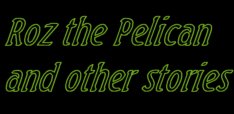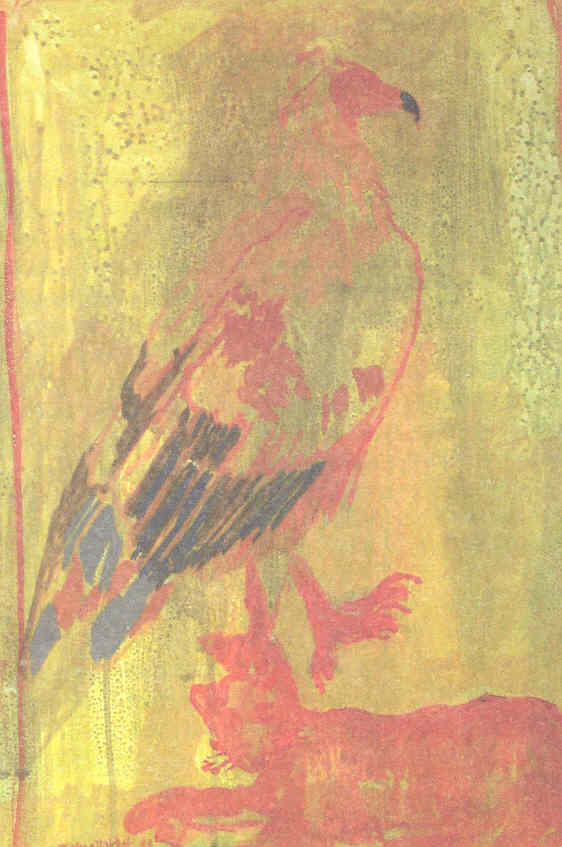


|
The Egyptian vulture is a type of small raptor. One of those birds which feed on life's leftovers and have been using tools, such as stones, to break ostrich eggs for far longer than there have been human beings on this planet. Our particular Egyptian vulture spent the first years of its life conducting aerial surveys of various mountain districts in Northern Greece in the hope of finding something dead to eat or to steal an egg from another bird's nest. He watched the other carrion-eating birds, such as the vultures and the crows and when he saw them descending and gathering around a certain area he knew that there was food there. Winters he spent in Africa. One day he misjudged the distance between two electric power lines. Do you think anyway he had been told that power lines were a threat to public health? He was electrocuted and came to us with severe burns. Because of the burns (although they healed) he was never again able to fly. From that time on he was obliged to continue his peregrinations on foot, in the yard with the pond. He didn't lose heart. He continued with undiminished determination to go out on his walks and there was not a hen's or duck's egg that escaped his attentive eye. The kitten - unlike the Egyptian vulture, who was travelled and had lived a life rich in experience - had not had the time to experience anything. Suckling for a few days, opening her eyes then to glimpse her brothers and sisters for the first time, she was suddenly seized by a huge hand that shoved her into a bag, along with the others. There she no longer saw anything and had difficulty breathing. After a little she felt a shooting pain of the kind that is caused by falling onto a hard surface. There was a bad smell outside the bag. If she had known even the slightest thing about the world she would have realised she was inside a large rubbish skip. One by one her brothers and sisters grew silent and then cold. She had remained alone - crying as loudly as she could - which wasn't really very loudly. At a certain moment she felt herself being transported to a warmer place and a little light managed to make its way between her half-closed eyelids. On her tongue was the taste of milk. Though not the same as what she was familiar with, it was similar - she recognised it. But she didn't manage to open her eyes fully. She was hurting everywhere: in her stomach, her bowels, her head. A shudder passed through her little body. Every now and again she would start to tremble. It didn't take the Egyptian vulture long to sport the sick kitten on the veranda. His knowledge of forensic medicine also enabled him to make the right diagnosis. "That cat doesn't have much of a future. Three or four days at most. With a little patience, I can have her for myself", he thought, "if I am there at the appropriate moment…" He immediately brought into effect a plan for keeping the patient under observation. He made regular visits through the day in order to keep himself informed on the progress of her condition. He observed the people trying to feed her and administer drugs. Naturally he knew what they were doing but, more experienced himself, he was convinced that they were wasting their time. The cat was truly going from bad to worse. Not only was she keeping her eyes shut and refusing to take food but on the third day, after they had filled her with holes in their vain endeavour to keep her alive through drip-feeding, she fell into a coma. Weak heartbeats and stifled breathing showed that there was still a little life in her. From a distance she seemed dead. "She's dead," thought the Egyptian vulture, or if she hasn't died yet she's about to at any minute. The Egyptian vulture came up. He gave the motionless cat a searching look with one eye. He saw no sign of life. But before eating her, he had to be certain not only that she was clinically dead but also that her soul had irrevocably departed this world. So he extended his foot and nudged her with it gently. Nothing. He nudged her with slightly greater determination a second time. No reaction. He approached from the other side and had a really good look at her. Then he saw something that surprised him: the kitten opened her eyes. "Och", thought the Egyptian vulture. "She's not ready yet…" And he went off, a little disappointed, but still optimistic. What I, who am telling this story, do not know, is how the Egyptian vulture really felt. I suppose his wish was that the cat should die and then that he himself should eat her. But perhaps it wasn't like that. Perhaps he simply didn't want the body to go to waste after the cat's death and in his heart he wished her well. He would always find something to eat anyway. He wasn't hungry and - praise the Lord - all of us are going to die one day anyway, whether we are kittens or people. Let us not forget those Tibetan monks who after death voluntarily offer their bodies to the Himalayan birds of prey, which they consider sacred, in contrast to us who go into the ground and offer our bodies to the worms. The question is simply which living organism we prefer after our death to make use of what we leave behind us when we depart. Personally I would rather have the open air and the birds of prey, who would at least carry me high into the heavens…. It is very likely that the kitten in her ignorance misinterpreted the whole story. What would she know about life and death? But she must, if God exists, surely in her deepest misery have glimpsed His heavenly eye. Yes, what she saw was a huge eye covering the entire field of vision. It cannot but have been the eye of Him who from on high sees everything. All-present, all-beholding…. The message was clear. From that moment her health began to improve. She did not die. She lived.
|